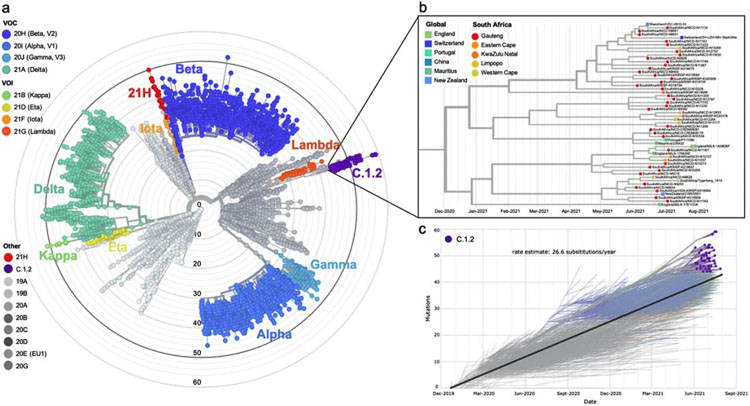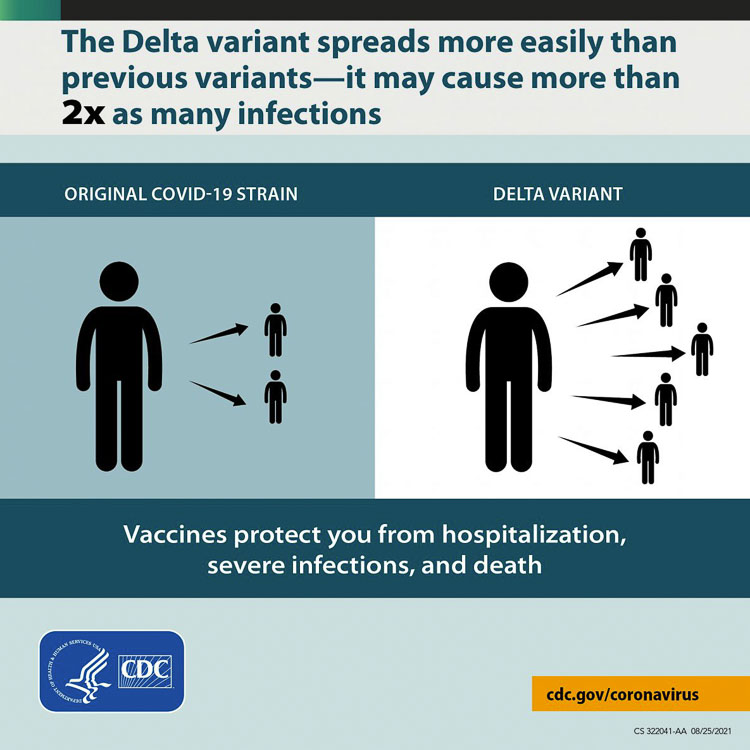Nearly double the global mutation rate of other variants
Scientists in South Africa have detected a new coronavirus variant with multiple mutations. They have yet to establish whether it is more contagious or able to overcome the protection provided by vaccines or prior infection.
This comes as the Washington State Department of Health (DOH) reports 73 percent of Washingtonians 12 and older have received at least one dose of COVID-19 vaccine, designed to recognize and respond to the original version of the virus. “Vaccination prevents severe illness and hospitalization and lowers your risk of dying from COVID-19,” reports the DOH.
In Clark County, the DOH reports 55 percent of people age 12 and older are fully vaccinated. Six percent of the county COVID-19 cases have occurred in people fully vaccinated. The state reports the least vaccinated age group is youth aged 12-17.
The new variant, known as C.1.2, was first detected in May and has now spread to most South African provinces and to seven other countries in Africa. The new research has yet to be peer-reviewed. The C.1.2 strain also has been found in 9 countries, including the UK, China, New Zealand, Portugal and Switzerland.
News reports say It contains many mutations associated in other variants with increased transmissibility and reduced sensitivity to neutralising antibodies. Scientists are not yet sure how they affect the behaviour of the virus. Laboratory tests are underway to establish how well the variant is neutralised by immune system antibodies.

The strain has a mutation rate of about 41.8 mutations per year, almost double the global mutation rate seen in any other existing variant of concern, according to experts at South Africa’s National Institute for Communicable Diseases and the KwaZulu-Natal Research Innovation and Sequencing Platform.
The number of C.1.2 genomes in South Africa has risen from 0.2 percent in May to 1.6 percent in June and 2 percent in July, according to scientists, who also have found 14 mutations in nearly 50 percent of the variants that had a C.1.2 sequence.
There are four other variants of concern of COVID-19 among scientists — Alpha, Beta, Gamma and Delta — and another four variants of interest — Eta, Iota, Kappa and Lambda — in global circulation. Alpha, Beta and Delta have had the most global impact in terms of transmission and immune evasion.
South Africa was the first country to detect the Beta variant, one of only four labelled “of concern” by the World Health Organization (WHO). Data from South Africa shows the C.1.2 variant was nowhere near displacing the dominant Delta variant in July.
In July, C.1.2 accounted for 3 percent of samples versus 1 percent in June, whereas Delta accounted for 67 percent in June and 89 percent in July. South Africa’s COVID-19 vaccination campaign got off to a slow start, with only around 10 percent of its adult population fully vaccinated.
Delta is the fastest spreading variant the world has encountered so far, and it is changing assumptions about COVID-19. The CDC reports “new data began to emerge that the Delta variant was more infectious and was leading to increased transmissibility when compared with other variants, even in some vaccinated individuals.”
Richard Lessells, an infectious disease specialist and one of the authors of the research on C.1.2, said its emergence tells us “this pandemic is far from over and that this virus is still exploring ways to potentially get better at infecting us.” Lessells said C.1.2 may have more immune evasion properties than Delta, based on its pattern of mutations.
That contrasts with an optimistic report a week ago saying there would be a decline in COVID-19 cases this fall. The new projection by the Institute for Health Metrics and Evaluation (IHME) shows that nationwide COVID-19 cases will likely start to drop around the beginning of September.
“We’re heading into a much better time simply because we have had a lot of infections around the country and we have a high percentage of people getting the vaccine,” said Dr. Ali Mokdad, IHME. “Covid-19 in many places is running out of people to infect, so you see that decline,”
Nationwide COVID-19 cases will start going down around the first week of September, with a continual decline through December, he shared.

Lower effectiveness against Beta, Gamma & Delta
The CDC currently reports:
“Data were added from studies published since the last update that demonstrate currently authorized mRNA vaccines (Pfizer-BioNTech and Moderna) provide protection against variants of concern, including the Delta strain that is now predominant in the United States. Vaccine effectiveness against hospitalization and death is high for all current SARS-CoV-2 variants; emerging data suggest lower effectiveness against confirmed infection and symptomatic disease caused by the Beta, Gamma, and Delta variants compared with the ancestral strain and the Alpha variant.”
It should be noted the vaccines were developed to recognize and respond to the original COVID-19 virus. Nearly 30 percent of coronavirus infections in the first four weeks of August have involved people who were fully vaccinated, according to Minnesota breakthrough COVID-19 data released Monday.
In a presentation to the CDC’S Advisory Committee on Immunization Practices on Monday, Dr. Sara Oliver said that since Delta appeared, vaccine effectiveness against hospitalization ranged from 75 to 95 percent. The vaccine’s ability to prevent infection ranged from 39 to 84 percent since the introduction of the Delta variant.
“Vaccines remain effective in preventing hospitalization and severe disease but might be less effective in preventing infection or milder symptomatic illness,” the presentation said. The slides said both waning protection over time and the Delta variant may be contributing to the lower effectiveness of the vaccines.
The news comes as a doctor in Turkey has claimed to have found a previously unidentified variant of COVID-19 in Izmir, the country’s third-largest province, the Daily Sabah reported.
Dr. Lütfi Çamlı, the head of Izmir Medical Association, warned on August 26 the new variant was also identified in other provinces and its rates among COVID-19 patients in Izmir recently rose to 40 percent.




